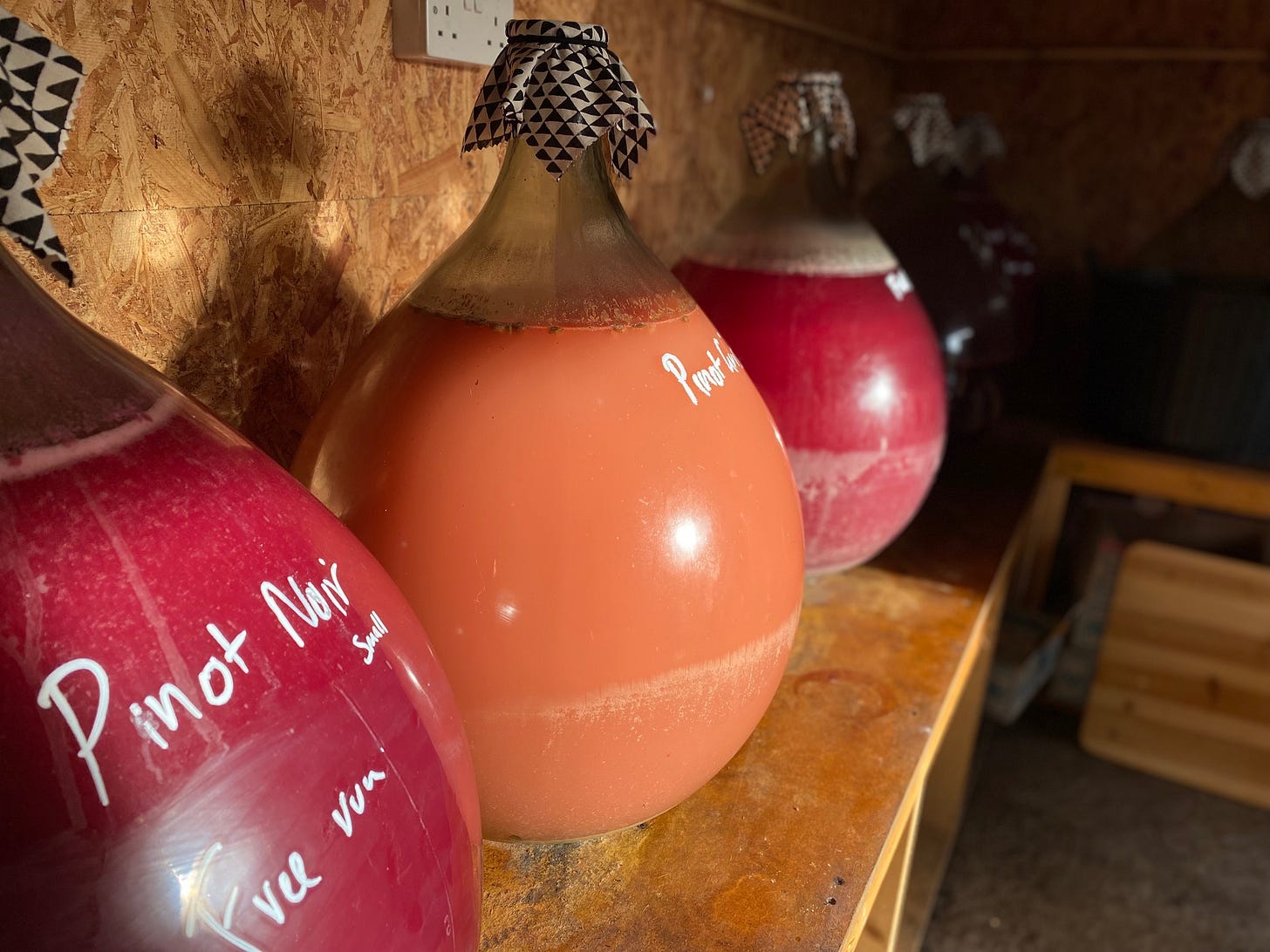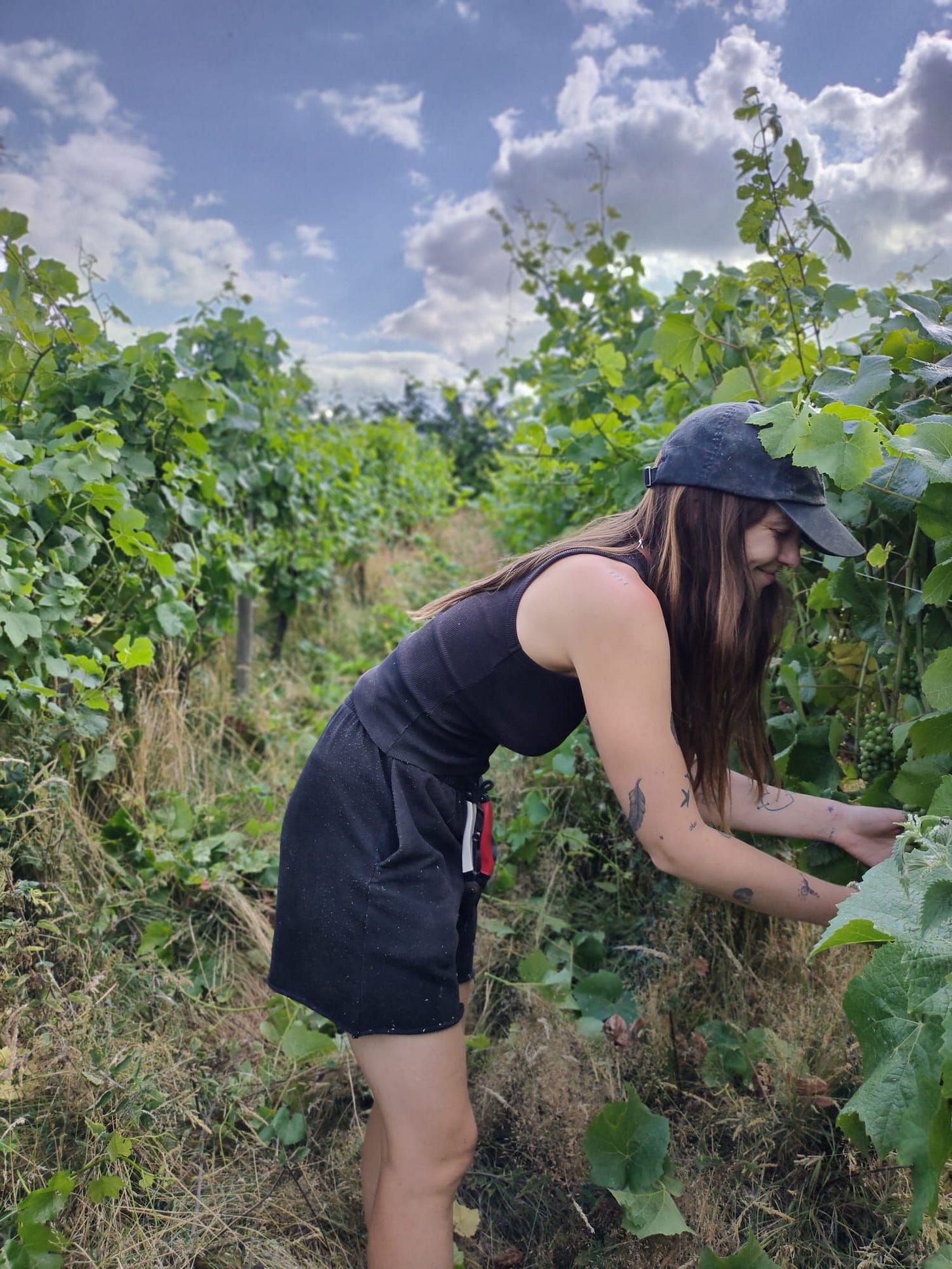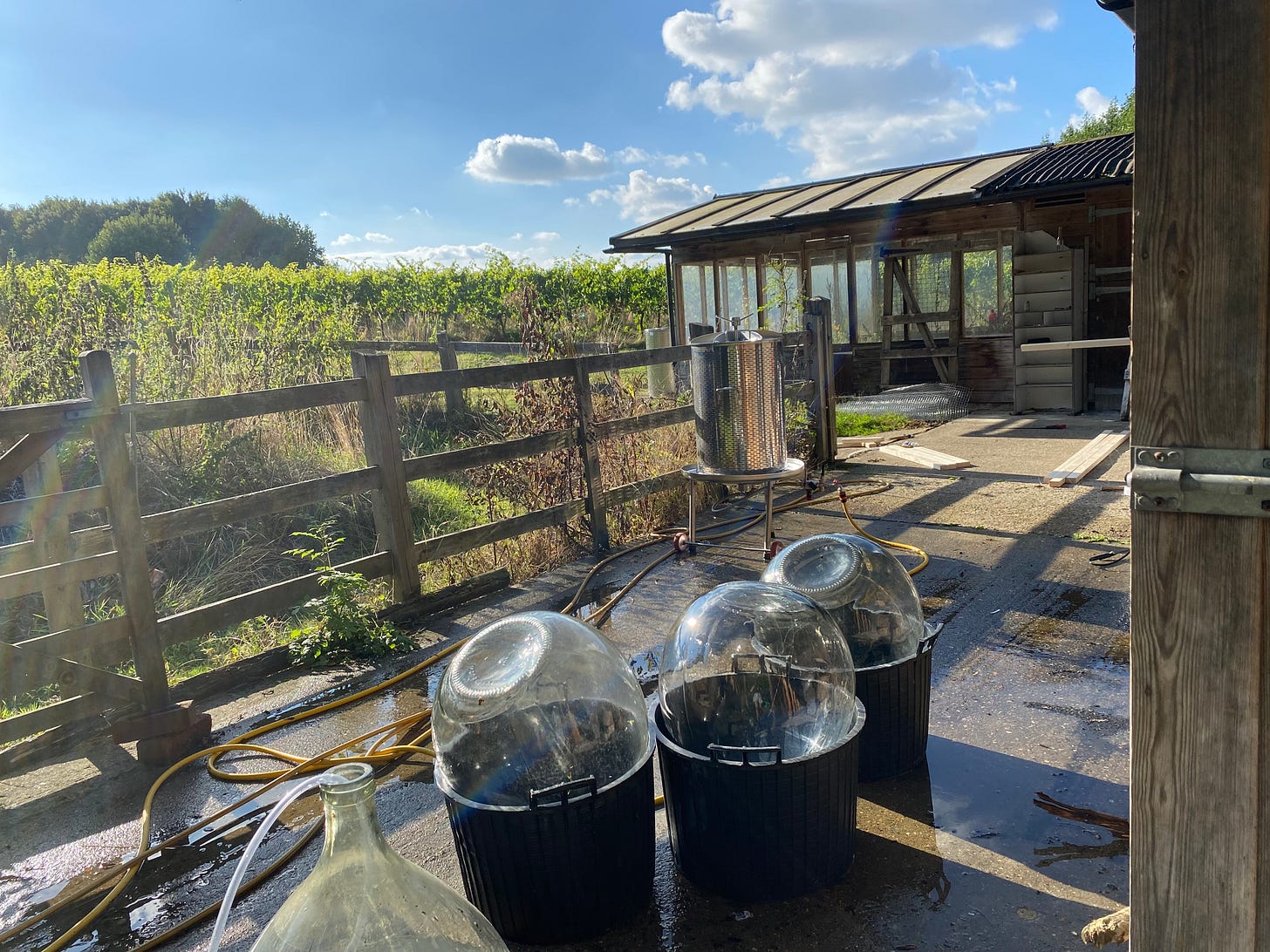Like Pavlov's drooling dog, we press the sparkling wine button and snaffle up a GB wine medal year after year. And we should, it's often delicious. But when 83% of British wine sales come from just 25 producers and when 68% of all production is bubbly, that word ‘diversity’ (or lack of) also bubbles up. A ginormous reason for so few producers accounting for so much owes to the going rate for land in the UK being approximately loads of arms and legs per hectare.
This brings us to the two industry staples for producing wine in the UK. Option one: find a finance bro to lob millions at an ambitious fizzy project; think Lord Ashcroft of Gusbourne or Mark Drive of Rathfinny. Option two: find hereditary farmland and convince the Earl or Lord to bugger off the apples for vines. Option three? Very unlikely. Hence, my simple objective is to give as much attention to the niche producers outside that 25, to sniff out their still stuff, the stuff under flor, the stuff in amphorae, the stuff made with instinct and dungarees. In other words, size doesn't matter… unless it's massive.
The hunt began in Dalston, a place where people dress, roast coffee, and disguise their posh accent better than you and I. It's excellent, as is Dan’s wine bar where I met Fionn, who's very interested in Britain’s small, quirky producers. Fionn led me to Wines Under the Bonnet and then to Sophie Evans who grabbed my attention when learning of a certain overhead power cable story that shall be saved for later. I soon got in touch with Sophie and asked to chat over Zoom.
Sophie is young and nice, very nice. She organically farms one hectare just outside Ashford in Kent and makes wines for the eponymous Sophie Evans project. She is one of many brilliant Plumpton graduates, or nerds as they shall be henceforth referred to. Plumpton is effectively Britain’s training ground for budding wine-related talent with many alumni heading up well established wineries, deciding lists for large restaurant groups, or even running large wholesalers. Considering the requisite costs and/or luck involved with British wine production, Sophie reasonably assumed life as a winemaker would keep her far from home. She worked in Germany whispering to Silvaner before realising her homesickness could be cured by an unlikely project in the southeast of England.
Courtesy of patience, friends with fingers in pies, and WineGB’s website, Sophie found a young couple who’d bought a big house with a vineyard attached. She lives an hour from her vines, which range from seven to eleven years old and spent two years growing freely, without any pruning. For the nerds, the vineyard soils are clay with the odd line of chalk running through and the varieties are Pinot Noir and Gris, Bacchus, and Rochsteiner. There is also a small barn-come-winery, stuffed with plump glass demijohns of unsettled juice and stainless-steel tanks.
Sophie is an uncertified organic champion, so fastidious in the vineyard (and I respect her for this) that she declined the help of my fat clammy hands with pruning. Evidently, she also has instincts for good decision-making in the vineyard. Organic viticulture in the UK is gutsy, the sopping wet maritime climate exposes vineyards to fungal infections, making the solution of potent synthetic herbicides and pesticides all the more tempting. Sophie’s decision to forgo these synthetics, once described by Tommy Grimshaw, Head Winemaker at Langham, as the “silver bullet… in a bad year”, is unquestionably admirable. Alternatively, Sophie utilises leafy teas, ferments, and essential oils to treat the vines.
“I find the vines are so much healthier and happier when they’ve got the teas. If there’s a spray round where I’ve run out of nettle teas and you just need to put something on, the vine’s almost thirsty [for the tea], it feeds their defence system…, healing the plant as opposed to plastering a wound”.
To dumb down the chemistry (to a point where I can understand), much of what is used in making synthetic herbicides can be found in nature, admittedly in lower concentrations, and these teas and essential oils make the most of that fact. It became very clear that Sophie’s relationship with organic viticulture is far from a marketing perk or solely in pursuit of taste and much closer to a philosophical outlook on her relationship to the land she farms.
A pair of Pinot Noirs are on the way from Sophie, and you should be happy about that. Pinot Noir is a bastard to grow and make, thin skins and tight clusters makes it about as resilient to moist climates as wine writers are to red noses. Requiring constant supervision, I can imagine Sophie’s attentive approach working some magic. Sophie spoke fondly of the Pinot with more extraction, spending 2 weeks on the skins and punched down twice a day before being pressed into stainless steel. “It feels like a serious wine” explains Sophie, a comment better understood when hearing of her ambition to produce styles “that aren’t like ‘ahh that [tastes] just like a natural wine’”. I suspect she wants the focus being on the quality of fruit used and their clarity of flavours as opposed to an evident waft of funk and volatility. More to the point, bright, juicy and easy to slurp styles of natural wine may sell like sex, but the more serious examples, ones that develop with age and provoke lengthy discussion, are unsurprisingly more gratifying to make.
Also en route is an orange Pinot Gris made using a combination of demijohn and stainless steel. Sophie mentioned that she finds the flavours in demijohns are both “more fruity” and “more unusual”. Her current hypothesis, for the cause of unusual flavours pointed towards microoxygenation through a thin veil of flor. Sophie tasted the wines for the first time since harvest on the evening I spoke to her. Though just a routine health check, making sure nothing tasted like a dog, she still had to remind herself that “until the wines wake up from malolactic fermentation, there’s no point stressing out because everything tastes super weird”. She went on to express concern for the 2023 vintage, and particularly the ripeness of the Pinot Gris compared to 2022, which benefited from an August heatwave. Sophie is very much sceptical of 2023’s bumper harvest celebrations, questioning the level of phenolic ripeness (easiest to think of as flavour ripeness as opposed to just measuring sugars). The summer was grey and soggy, or to use the technical term, ‘shit’. So those two and half weeks in September spent ringing out sweaty t-shirts weren't exactly enough to overcome the under ripe months prior. The ripening season was similar to cramming in revision the night before: definitely needed, but the knowledge would sink in better with more time.
I’ll finish, as promised, with the tale that drew me to Sophie Evans. This is the origin story of the ‘electric field blend’, 50% of which is Rechensteiner and, as of January 24th, tastes “very fruity”. Admittedly, I wasn’t there so I have had to fill in some small gaps, but the story goes like this:
Wind whips through the vineyard, falcons and the occasional crowned eagle begin circling Sophie’s crop. She reaches for her kite, the kind of kite that makes a falcon go “anything but that fucking kite”. She boots the barn door open and surveys the threat with the stance of a miffed bull. Sophie and her boyfriend charge to the Pinot Noir, raising their weapon. The kite flaps and the falcons soon flee on a gust that now drags the kite towards overhead power cables.
BZZZZZZZZZZZ!
Sophie and her partner are thrown into an electric spasm. The smell of cooked flesh rises (this bit is true) from a foot with a 5p-sized hole zapped through it. Sophie’s boyfriend had trod on a pin that day, directing all the current through his foot, sparing them both. It was at this moment that Sophie (probably) turned to her boyfriend and said, I'm going to call this wine the ‘electric field blend’.
People like Sophie Evans are very important. They are emblematic of something excellent emerging as more of the UK is planted under vine: fearless, young, and fastidious winemakers willing to experiment in the vineyard and cellar. It is the curious folk like Sophie who will be the ones to stumble on a little slope in Britain and nurture a niche variety into a superb cult wine. I hope to be there with a bucket sized wine glass and an unquenchable thirst when they do.







Thank you for this article Will much like Sophie's wines, we need more of these as well.
"The ripening season was similar to cramming in revision the night before". Love this!
Cheers, Luke
Charge of the Pinot Noir brigade